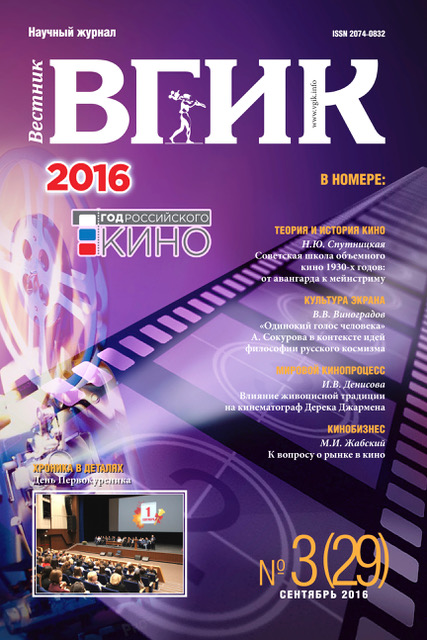On The Matter of Market in Cinema
- Authors: Zhabskiy M.I1,2
-
Affiliations:
- НИИ киноискусства ВГИК
- Государственный институт искусствознания
- Issue: Vol 8, No 3 (2016)
- Pages: 128-140
- Section: FILM BUSINESS | MANAGEMENT STRATEGY AND TACTICS
- URL: https://journals.eco-vector.com/2074-0832/article/view/14719
- DOI: https://doi.org/10.17816/VGIK83128-140
- ID: 14719
Cite item
Full Text
Abstract
At cinema’s inception the market played the role of the midwife. Further on, market relations had been one of the fundamental framing conditions for the formation and the development of cinema as a social institution, with all its merits and demerits. It was along the pathways of the market that cinema crossed over from France to Russia. The state more suffered it rather than accepted it. Nicholas II deemed cinema «a vacuous, no-good-for-anyone, and even harmful entertainment». Of the same opinion initially was V. Lenin. But, having positioned himself at the helm of the state, he put forth the task of turning cinema into «artistic propaganda» and the most important of the arts. Commerce in cinema was subjected to an ideological and aesthetical anathema. However, market relations did not cease to exist altogether. They rather took on a rudimentary and truncated form. But even in that state, market relations came to be one of the decisive conditions for the cost-effectiveness of Soviet cinema. Since many deny it, in the article this viewpoint is overturned by an analysis of statistical materials from 1976 and 1986. It is shown that the cost-effectiveness was concealed by draconian taxation and the economically groundless expenditure on operating the exhibition network which had been built with a view of film service to the entire population, including the rural. In the late 1980s, on the initiative of the Soviet state, a turn was executed toward a legitimate socialist market. But in reality, only the first steps were made in that direction. Intervene did the demise of the state regime in the USSR. In the post-Soviet period a proper development of the market mechanism did not come to pass. Functioning primarily thanks to the state financial support, the national cinema of contemporary Russia is of a mixed sort: a public-mercantile one.
Keywords
About the authors
Mikhail I Zhabskiy
НИИ киноискусства ВГИК; Государственный институт искусствознания
Author for correspondence.
Email: editor@vestnik-vgik.com
PhD in Sociology, Head of the Sociology of Screen Arts Department at the Institute of Film Art (VGIK); Leading Researcher at the State Institute of Art Studies
References
- Михайлов В.П. Рассказы о кинематографе старой Москвы. - М., 1998. - 290 с.
- Лебедев Н. Внимание: кинематограф! - M., 1974. - 438 c.
- Лихачев Б. История кино в России. - Л., 1927. - 209 с.
- Кино: пути от фильма к зрителю / под общей редакцией М.И. Жабского. - М., 1998. - 268 с.
- Жабский М.И. Как возможно «свое» конкурентоспособное кино // Вестник ВГИК, 2013, № 16. С. 102 -120
- Интервью / Карен Шахназаров: // URL: https://rns. online/interviews/ Glava-Mosfilmaob-ekonomikerossiiskogokino-2016-03-28/ (дата обращения: 20.04.2016).
- Съезд кинематографистов // Киномеханик, 1998, № 8. С. 2.
- Сергей Члиянц: «Иногда стыжусь слова “продюсер”» // Кинопроцесс, 2003, № 3/4. С. 162
- Зиновьев А.А. Гибель «Империи зла» // Социологические исследования, 1995, № 2. С. 72
- Интервью / Карен Шахназаров: https:// rns.online/interviews/ Glava-Mosfilma-ob-ekonomike-rossiiskogo-kino-2016-03-28/ (дата обращения: 20.04.2016)
- Prokop D. Soziologie des Films. Frankfurt am Main, 1982. S. 26-27.
- Лебедев Н. Очерк истории кино СССР. Т. 1. Немое кино. М., 1947. С. 7.
- Лихачев Б. История кино в России. Л., 1927. С. 24.
- Садуль Ж. Всеобщая история кино. Т. 2. Кино становится искусством. 1909-1914. М., 1958. С. 300.
Supplementary files








